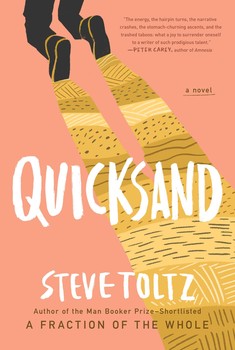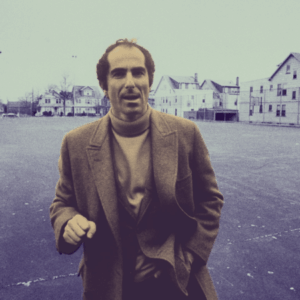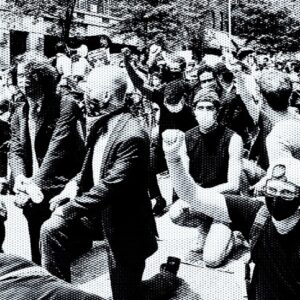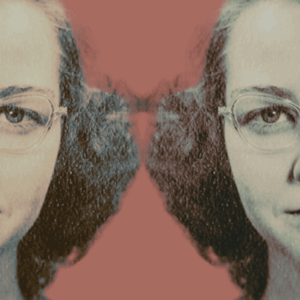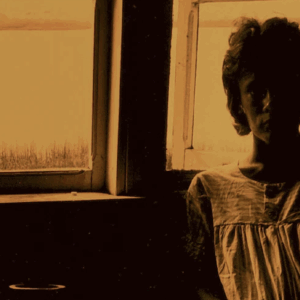I remember when Aldo stopped pretending to reach for the bill. It was the year his ringtone was the hum of crickets and he turned his sights on that vast potential field of golden poppies—the internet. His two big startups were a matchmaking service to hook up all the left-over single women in New York and London with all the one-child-policy single men in Shanghai and Beijing— he’d either overestimated the desperation of the women or underestimated their racism—and a porn website called Fruit ’n’ Vag that specialized in links to repugnant and unthinkable niches like “Biblical” that way misjudged even sex-toy advertisers’ willingness to be associated with videos of Mary Magdalene with the Good Samaritan’s donkey. But no, he couldn’t even make money in the oughts! Just like during the previous years of failed ventures, his crashed food truck, the shut-down warehouse dance parties, vandalized health-snacks vending machines, malfunctioning peanut-allergy divining wand, aborted tanning-salon taxi service, etc., he once again fell almost stealthily into arrears; he stopped even intending to pay bills, threw his mobile phone into the sea. As he had after all the other nosedives, he convinced himself he’d finally arrived at the terminus of entrepreneurial life, and his disconsolate figure could be seen trundling here and there, sitting in the sunshine smoking cigarettes, taking up a whole bench with his long body and overhanging feet, his head resting on corrosive bird shit, hardened gum, dried saliva. You would find him, in those days, in a crowded food court trying to saw through the burnt underside of a baked potato with a plastic knife, looking quasi-homeless, with shaggy hair and old jeans and moving with a strange lethargy, because, according to him, “Debt has its own pulse, central nervous system and physical weight.” When Aldo heard his name hissed and bellowed from car windows and street corners, he’d give a discreet wave or shrug. When accosted in shops and pubs by various creditors who accused him of responsibility shirking or downright thievery, sometimes he ran, sometimes he accepted their insults, threats, and the occasional physical blow. Then there were those who came to his door, not just creditors, but their wives and daughters, pleading for money. He desperately wanted to repay them, but short of harvesting his organs, there was nothing he could do. To be ignominiously saddled with incalculable debts is to be permanently demeaned, and even though he borrowed from men who rubbed cocaine on their dicks and told relative strangers about it, he lived in a state of inferiority and constant mortification; he felt subordinate to everyone in any given room. In bathrooms he avoided his mirror image, from every angle a man in defeat. Even watching movies where the characters spent money on restaurants or clothes made him sick with jealousy. No wonder perpetual debt servitude is the most irrefutable factor in the male suicide rate, though just as often Aldo imagined an unlucky detective investigating his murder, sifting through photos of hundreds of enervated suspects.
And Leila! What he had done to his poor mother didn’t bear thinking about. He’d broken every social contract when he borrowed from her and from his girlfriend. What exactly was it that made these women so blindly, so uncritically supportive?
One night Aldo was lying in bed praying to become a voiceless faceless thoughtless drifting eye cruising through space and time before disappearing in a violent white flash. This was not the first time he’d had a version of this fantasy. Stella was asleep in shrunken leather pants she’d worn in a sauna for a music video. He pushed himself gently off the mattress and went to the kitchen, poured himself a whiskey, and applied for a new credit card, then tore up the application and wrote the following letter: Dear Sir/Madam, I’m honestly not sure about this alarming version of destitution whereby a veritable pauper is allowed to gad about like a respectable person and even apply for additional credit cards such as your bank sends me unsolicited in the mail. I try to reassure myself that “everyone’s in debt nowadays” but the fact of it being an epidemic doesn’t help one iota, any more than the knowledge of being swept up in a fatal plague would aid in any practical way the infected individual. He tore up the letter, and dug out his mother’s bills. That very afternoon, he had dropped by Leila’s ground-floor apartment and stood on the busy street watching his mother at the sink, crushing her cigarette into the potted plant next to the wilted celery in a glass. Behind her, a man dressed in black entered and rested his hands on Leila’s shoulders. He thought: Who’s this motherfucker? The man in black smiled like a clown in a horror movie. His hair was white and his nose was so flat it looked to be embossed on a graven image of a face; he was a man with no profile whatsoever. Gah, another priest.
He went inside.
“Father Charlie, this is my son, Aldo.”
The priest dropped his teaspoon into the cup he gripped with bony hands.
“So this is the young man who couldn’t be satisfied making a living instead of a fortune, who has impoverished his poor mother.”
Aldo stiffened; he felt dirty just being in this priest’s line of sight and thought, not for the first time, of what Henry would have made of Aldo dropping his mother in the lurch. He said nothing but thought: What’s a man who clutches at straws for a living doing here anyway? Father Charlie stood there, one eyelid flickering. The kitchen was a mess. Leila could never close a drawer or cupboard door or replace a lid after using it. Stuck on the fridge door were overdue bills with red stamps and highlighted numbers from which Aldo averted his gaze and instead glared wildly at the priest, wondering if he was one of those men who came to God late in life, after he’d hit rock bottom and left a trail of sadness and illegitimate children. Father Charlie looked like he wanted to call on his higher power for backup. Finally he said, as if he had to unglue his mouth to speak, “I’ll be off, Leila.”
“Don’t let the door hit you in the immortal soul on the way out,” Aldo said.
Leila betrayed her groan of disapproval with a slight smile.
With the priest gone, Aldo and his mother curled up on adjoining sofas in the living room, with its chintzy fake fireplace, glass purple grapes, and her framed self-portrait in needlepoint, and Leila debriefed Aldo on her status quo. She was being sued by her lawyer for unpaid legal fees; a breast cancer screening test was clear, but she had reason to fear false negatives; the local crime rate was up and she was on the verge of a home invasion; the students at her acting school had deserted her; and physically, her life was entering a new period, its worst one yet—varicose veins, osteoporosis. “And—I’m just going to say it. Block your ears if you don’t want to hear it.” Aldo blocked them, but not enough to stop the words prolapsed uterus. “Old age,” Leila said, “it’s like walking the plank.” She buried her face in her hands and said, “Thank God my parents are dead and don’t have to see their little girl in this situation.” Aldo said, “That’s a strange thing for an old woman to say.” They talked on and on, they shushed each other and berated the other for shushing (“Don’t shush me!” “You shushed me first!”) and let the room darken around them. The night was full of eyewitnesses. Aldo stared out at the stuporous pedestrians: a man bone-white in the moonlight; a group of young people, one of whom grabbed his crotch and gyrated. She had curtains. Why didn’t she close them? Some of the faces seemed close enough to touch. Only the barred windows kept the spectators from actually climbing inside. When it was time to go, the topic of conversation finally hit the target it had been ducking and weaving. Leila couldn’t meet Aldo’s eye when she confessed she had become so afraid of the bills she couldn’t even bring herself to touch them. Aldo scooped up the pile stuck to the fridge.
“I’ll take care of these.”
“How will you? How?”
“I’ll work it out. Don’t worry so much.”
* * * *
Out on the road, Aldo stood under the yellow streetlights casting their little puddles of buttery light, and with shaking hands opened all the letters and bills and overdue notices. He was stunned; she hadn’t paid her health insurance and it had expired, none of her medications were covered, and she wasn’t paying the mortgage either. He drew in deep breaths and sat right down on the footpath and calculated: nine thousand dollars just to get back to one month behind. Taking care of the woman he had personally impoverished now seemed impossible.
In his own house at three in the morning, staring at those bills, he thought: I should have died in puberty. It was a cloudy night. Out the window, the blades of grass looked black. The tiniest sliver of moon was barely visible over the serrated treetops, and his eyes angled down to the garden he was contractually obligated to maintain, to the space between the brick barbecue and the dead tree, the designated location for the music studio he’d promised to build for Stella with the landlord’s permission. Yet he couldn’t afford the materials for a basic shed. This was something Stella had begun to mention, often and snidely. In truth, he had detected a subtle shift in his girlfriend’s patience and attitude lately. She still paid uncomplainingly for their groceries with her meager earnings gigging at various pubs and her part-time sales job at Tentworld, and greeted him at the door with loving enthusiasm as if he’d just returned from World War I, but he felt demoted in her esteem and suspected she was getting through entire sexual episodes using muscle memory. At that moment, he remembered he’d impulse-bought a hospital-quality blood-pressure kit from a medical-supply company and for the rest of the week he’d have to skip meetings in order to be sure to intercept the postman. Aldo banged his head against the glass. How was he going to get out of this?
He shut his eyes, emptied his mind, savored the emptiness. He heard a voice, his own voice, say, “What about opening a B, B, & B—Brothel, Bed, and Breakfast?” Maybe. “Why not?” Because who wants to stay overnight in a brothel, that’s why not. He gave himself a mental thumbs-down, and spent another minute moving his lips, waiting for sound to emerge. He said, “What about selling extra storage space to hoarders?” Now that had potential. Untapped customer base, unmet needs, plenty of room (heh-heh) for repeat business. Aldo slapped his hands together. His ambition was getting back up on its feet. He would not take dismal failure for an answer, and like always, his trampled spirit was set to regain its original shape. Or was it? There was something different this time; for once he didn’t feel his irrepressible optimism skyrocketing, because now he realized the truth of his relationship—what he had long thought was symbiotic was actually parasitic, and he wasn’t the host. He stood there in a sad daze, mourning every decent version of himself he’d ever imagined.
“Hey.”
Stella was gliding toward him in her bathrobe like a weary traveler on an airport walkway. Aldo remembered she wanted to go to the cinema tonight but they couldn’t even afford the tickets, and the dumb thing was she only went to the movies to eat popcorn. “Hey baby, you’re awake,” he said, putting his face through a sort of grinder to make a smile.
She leaned her hand on the fridge and loomed over him, oversized and fretful.
He asked, “Are you OK?”
“That depends on your idea of OK.”
“Well, are you—”
“Pregnant?” she said. “If that was your question. Yes, I am. Thanks for asking.”
* * * *
Umm-ing and ahh-ing in the abortion clinic parking lot, they were horribly, almost comically indecisive, having peeked inside at the receptionist’s bouffant, the unfortunate red carpet and jittery clientele, and were now sitting on the bonnet of their ’94 Corolla arguing against each other’s counterarguments as thoughts came in pairs with opposites attached. They used to have talks, now they had conferences. Stella’s eyes were wide and steely, as if she’d evolved to a place beyond tears; she was saying how motherhood sets your career back five years, and in a world where five male years is equal to twenty female years, that just about fucks her. The sun was burning through the clouds and the puddles on the pavement had already grown hot. This baby in her belly wasn’t the issue, she went on, because what you’re betting on—or against—is a future child. If years later you can’t fertilize an egg to save your life, then the one you threw back will be the one you regret.
“It would be an easier decision if I was established like Francesca, but I’m far from it.”
Her frenemesis Francesca had released her debut album to acclaim and was now recording her second and touring the southern United States.
“On the other hand, we’re about the right age to get going on this, biologically speaking,” she said. “On the other hand—”
“The first hand?”
“As breadwinners, we’re fucking losers.”
Hot shame flooded his body. “We’re so chronically in debt, I just honestly don’t know how we’ll manage,” she said. Aldo felt blindsided by this obvious truth. Stella had come through for Leila, selling the Steinway grand left by her parents, allowing him to consolidate Leila’s debts into one monthly payment, and while Stella had not given him a hard time about it, now he saw her nonchalance as all veneer. “I know you believe wholeheartedly in your high expectations and the yield they’ll bring us, but what if they don’t? I mean, sure, having a baby would give purpose to our lives,” she conceded, “but bringing a child into a purposeless life to give it purpose is a strange sort of logic that ends nowhere, don’t you think?” Aldo had never seen her so manic but knew she was worried that the integrity of her uterus had already been compromised by an earlier, half-regretted abortion, thanks to one of those mentors she’d slept with in high school (one of those older, bearded guitarists from her pre-Aldo days), and that this might be her last chance.
A woman pushing twin boys wrestling in a shopping cart passed by them and Stella slid urgently off the hood, as if late to an ambush. She startled the stout woman with her sudden approach and then had to bend down so they shared an eye line, their faces close enough, Aldo thought, to transmit conjunctivitis.
While she was occupied he reached through the car window and grabbed Stella’s journal, wedged open on the backseat. Two lyrics on the dog-eared page caught his eye: Hitler brought his A game / to the genocide, a phrase taken verbatim from Aldo in conversation with her uncle Howard, the scientologist, and I’m going to fuck you / back to the Stone Age, which he’d expressed in a private moment of passion. He was, in all honesty, growing tired of being the source of inspiration for her songs—if he was parasitic financially, she was parasitic artistically, and what had at first felt flattering and mutual now felt weirdly draining.
Stella returned looking unsatisfied.
“What did you say to her?”
“I asked why she had children.”
“What did she say?”
“She didn’t know.”
Stella put a cigarette in her mouth and lit it. Aldo imagined an ancient looking newborn hacking like an old Vegas comedian.
“Should you be smoking?”
“Right now not smoking is like arranging deck chairs on the Titanic.”
Aldo thought about sleeplessness, incessant laundry, and repurposed breasts. He alternated between a vision of a monstrous apparition of a deformed baby and one of a perfect baby, with negligent parents, falling down the stairs. He imagined the abortionist’s backstory: a young man with a hook for a hand getting into medical school. He imagined Stella giving birth to a terra-cotta warrior, to an eel.
Stella crushed out the cigarette with self-disgust. “Drinking and smoking are part of my musical identity,” she said, and added that on Sunday night she heard the smoke-torn bluesy voice of God tell her she should keep this child.
“Were you stoned?”
“So what?”
“Have we maneuvered ourselves into the position in which we can only do the negative act, the act of not-doing—in this case, not having the abortion? Because when your chief aim in every dilemma is to avoid excruciating regrets, once you’ve overthought something, doing the positive act—in this case, having the abortion—could haunt us forever.”
“This! This is what I’m worried about.”
“Meaning what?”
Since learning of her pregnancy, Aldo had voiced random facts: Statistically, human mothers are more likely than fathers to kill their own offspring. He had raised concerns about heart defects, cleft palates, spina bifida, clubfoot, Tay-Sachs disease, phenylketonuria, and meconium aspiration, where the baby ingests its own first shit and washes it down with amniotic fluid—every horror story he had ever been upset and haunted by in the Sunday papers. “Why not us? We’re youngish, the odds are against anything terrible happening, but that’s what makes them so frightening! We’re one chromosome away from becoming nurses and carers!”
He thought how the older Stella got, the greater the risk of birth defects and age-related dangers and illnesses, and Aldo started to feel annoyed; he wanted to say the words he couldn’t: This was her fault, always skipping her pill. She couldn’t remember to take it, then would cram them in all at once to catch up; it was she who had said, “It’s OK to come inside me.” Stella turned up Jeff Buckley on the car stereo. It was inconceivable to have a major life moment without a soundtrack.
“OK. Let’s be logical,” Aldo said. “On the one hand, the problem with having children is that on your deathbed you’re surrounded by people who’ll profit handsomely from your death. On the other hand—”
“Hey look!”
The clinic was closing. It was already six o’clock. The stocky receptionist locked the doors and climbed into her white Holden and drove away. There was suddenly nobody around, as if a set had been cleared. Aldo imagined he heard the orange sun grunt with relief as it fell behind the buildings. Night was coming swiftly and the streetlights fired up.
“So I guess that’s that,” she said impassively.
“We can come back tomorrow.”
“No.”
It was all there in her eyes, a growing merriment, a decision. They stared with nervous excitement at each other, formulating the same future.
“It’s going to be tough-going,” Aldo said.
“Rule number one. We can’t both have one foot out the door at the same time. When one person is feeling hateful the other isn’t allowed. Second rule. We can both be depressed, but only on alternating days. You can take Mondays, Wednesdays, and Fridays, I’ll take Tuesdays, Thursdays, and Saturdays.”
“What happens on Sundays?”
“We’ll be happy on Sundays.”
“Deal,” Aldo said.
“You sure?”
“Positive. You?”
“I’m in.”
Aldo punched the air. “I can’t wait for the next time some fucker says to me, ‘Unless you’re a parent you can’t understand.’ I’ll be able to wave my fucking baby in his face—”
“And you know what else I think we should do? Let’s get married!”
“Hey now, one monumental decision at a time,” he said. There was a long silence in that cold spring twilight. How had she come to this absurd conclusion? What did one thing have to do with another, in the twenty-first century? It was almost illicit! He was beset by a crazy moment of suspicion—had this been her endgame all along? He said nothing, and said it for so long, Stella grew sullen. He embraced her and whispered in her ear, “Listen, Stella. Whenever I hear that someone has stayed monogamous for forty years it reminds me of when you see in The Guinness Book of Records that someone has walked a thousand kilometers with an egg on his head. I mean, I admire his endurance. But what the fuck did he do that for?”
From QUICKSAND. Used with permission of Simon & Schuster. Copyright © 2015 by Steve Toltz.









